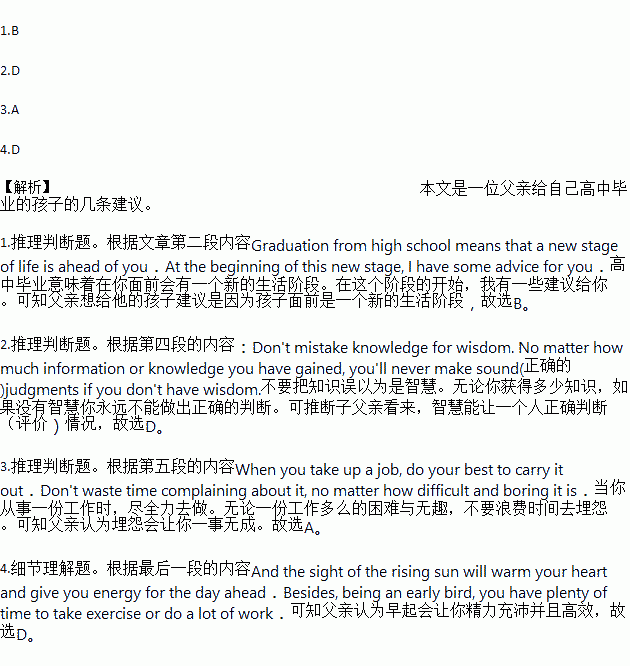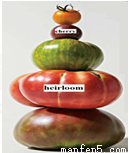题目内容
The following is a father's advice to his son or daughter, who has just graduated from high school:
First of all, congratulations on your graduation!Graduation from high school means that a new stage of life is ahead of you.At the beginning of this new stage, I have some advice for you.
Clean your own room and do your own laundry(洗衣物的活). After you have messed up(弄乱)something, you should learn to clean it up yourself.Cleanliness is indeed close to godliness(信奉上帝).
Don't mistake knowledge for wisdom. No matter how much information or knowledge yo u have gained, you'll never make sound(正确的)judgments if you don't have wisdom. Wisdom comes from imagination and reflection(反省).If you can imagine the possible future outcomes of your present decisions and actions, you can avoid mistakes.And if you can reflect on the mistakes you have made, you can avoid making the same mistakes again and again.Such is wisdom.
u have gained, you'll never make sound(正确的)judgments if you don't have wisdom. Wisdom comes from imagination and reflection(反省).If you can imagine the possible future outcomes of your present decisions and actions, you can avoid mistakes.And if you can reflect on the mistakes you have made, you can avoid making the same mistakes again and again.Such is wisdom.
Don't complain.When you take up a job, do your best to carry it out.Don't waste time complaining about it, no matter how difficult and boring it is.
Finally, be an early bird.If you get up earlier than the sun, you can watch it rising up slowly into the sky.And the sight of the rising sun will warm your heart and give you energy for the day ahead.Besides, being an early bird, you have plenty of time to take exercise or do a lot of work.
1.The father wants to give his daughter some advice, because ___
A. the father is a philosopher(哲学家)
B. another period of life lies ahead of him/her
C. he/she does not know how to behave himself/herself
D. the teacher is disappointed at his son's/daughter's performance
2.According to the father, wisdom enables one to ________.
A. avoid one's responsibilities B. acquire(获得)a lot of knowledge
C. complain about many things D. evaluate(评价)situations correctly
3.In the opinion of the father, complaining ________.
A. gets you nowhere B. is a pleasant thing
C. usually leads to success D. can be appreciated by people
4.The father says that being an early bird makes one ________.
A. sleepy and tired B. clean and happy
C. hungry and angry D. energetic and efficient(高效的)
 天天向上一本好卷系列答案
天天向上一本好卷系列答案 小学生10分钟应用题系列答案
小学生10分钟应用题系列答案


 e fun giving catchy names to varieties: Mortgage Lifters, Beefsteaks, Oxhearts, Early Girls.
e fun giving catchy names to varieties: Mortgage Lifters, Beefsteaks, Oxhearts, Early Girls.